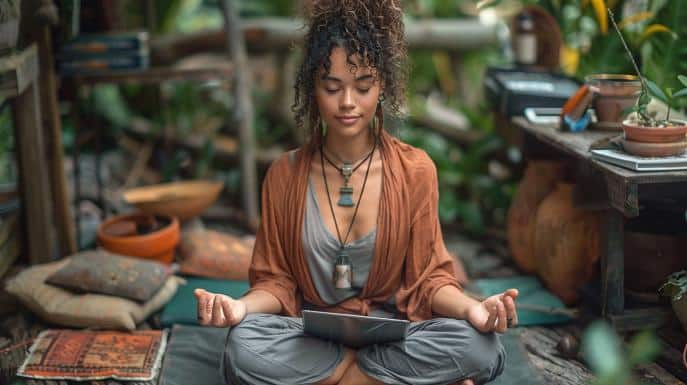In the pulsating universe of incessant notifications and endless digital streams, the podium of sanity is conquered by those who master the art of balance. “Digital Detox: Guide to a Balanced Life” is your atlas on this journey of rediscovery, towards an oasis of tranquility. Learning to turn off not only your devices, but also the demands they impose, is a path to a full and conscious life. Open up to the benefits of screen detox and embrace device-free breaks, understanding the vital importance of each step to well-being and genuine happiness.
Why is it essential to carry out a digital detox regularly?
Carry out a digital detox periodically is crucial to reestablish a balance between digital and personal life. Excessive use of devices can lead to health problems, such as eye strain, bad posture and issues related to mental health, including anxiety It is depression. To establish device-free intervals helps to improve the well-being by reducing the negative impact of excessive digital consumption. The psychological benefits are wide and significant, covering from a improves sleep quality – due to less exposure to blue light – up to a increase in productivity, caused by less multitasking It is distractions. Furthermore, the quality of relationships can be improved through personal conversations most significant, to the detriment of interactions that are often superficial on the social networks. Recognizing the signs of need for technological detox, how to feel anxious notifications or having difficulty disconnecting, it is crucial to maintain a balanced life and full.
How can I start my digital detox?
To start a digital detox, adopt techniques to reduce the use of technology. Initial strategies include setting specific times to check emails and social media and avoiding electronic devices during meals and before bed. There are apps that help with digital detox by monitoring and controlling the time spent on devices, they can be useful tools in managing your digital routine. Additionally, mindfulness practices, such as meditation and full attention, are effective ways to promote digital disconnection, keeping you present and aware of your actions. These approaches can help reduce screen time and increase overall well-being.
What activities can replace time spent on electronic devices?
To replace time spent on electronic devices, outdoor activities, developing non-digital hobbies and face-to-face socialization are valuable alternatives. By choosing hobbies such as gardening, painting or sports, you not only reduce exposure to screens but also enrich varied skills and interests. Contact with nature and practicing physical exercise outdoors contribute to physical and mental well-being, contrasting the adverse effects of prolonged time in front of screens. Furthermore, face-to-face meetings foster deeper and more genuine interpersonal relationships, as opposed to the often superficial interactions on social media. These activities encourage a more balanced lifestyle, enhancing quality of life.
How to maintain a healthy balance between digital and personal life?
In a world where remote work has become the new norm, balancing work and personal life requires intentional strategies. Some effective tips include establishing specific times for work and completely disconnecting after this period to dedicate yourself to personal activities and rest. Negotiating electronics-free weekends is another tactic; it's about only setting aside time for activities that don't involve screens, providing a valuable break from constant digital stimulation.
For those seeking a deeper immersion, planning a digital-free vacation is essential. Choosing destinations or activities that naturally limit the use of digital devices can be extremely beneficial, allowing for complete disconnection and an opportunity to reconnect with yourself, nature and loved ones. By adopting these approaches, you can create a healthier balance that values both technological efficiency and personal well-being.
Our journey through digital detox took us along paths that reveal the importance of this practice for quality of life. We discovered the clear signs of technological excess and the psychological benefits of taking a break from screens. Furthermore, we explore strategies and tools that help us take the first steps in this direction, with mindfulness and specific applications. Outdoor activities and the recovery of face-to-face socialization emerge as strong allies in this process, reminding us of the joys that reside outside the digital environment. To top it off, we evaluate how to maintain balance in a world where the virtual and the real are intertwined. The final reflection is clear: incorporating digital detox into our lives is not only beneficial, it is essential to reconnect with what is most human in us.
Frequently Asked Questions (FAQ)
How important is it to carry out a digital detox periodically?
Periodically carrying out a digital detox is essential to reestablish the balance between the digital world and personal life. It contributes to minimizing health problems such as eye strain, poor posture, anxiety and depression. Additionally, device-free breaks improve well-being and provide psychological benefits, such as improved sleep quality and increased productivity.
How can I start a digital detox?
To start a digital detox, you can set specific times to check emails and social media, avoid devices before bed and during meals, and use screen time monitoring apps. Additionally, mindfulness practices such as meditation and full attention can help promote digital disconnection and remain aware of your actions.
What activities can replace time spent on electronic devices?
As an alternative to time spent on electronic devices, you can engage in outdoor activities, pursue non-digital hobbies, and socialize face-to-face. Such activities include hobbies such as gardening, painting or playing sports, which not only reduce screen time, but also enrich your skills and interests. Contact with nature and outdoor exercise contribute to physical and mental well-being, while face-to-face meetings foster deeper and more authentic social relationships.
How can I maintain a healthy balance between digital and personal life?
To maintain a healthy digital-life balance, set fixed times for work and completely disconnect outside of these periods, set aside electronics-free weekends, or plan vacations in places that promote digital disconnection. These strategies help create a balance that values both technological efficiency and well-being and personal development.



